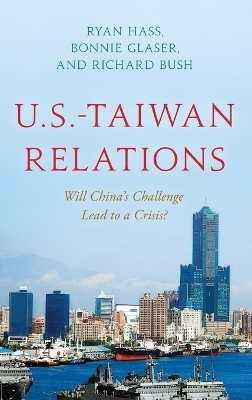
U.S.-Taiwan Relations
Will China's Challenge Lead to a Crisis?
Seiten
2023
Brookings Institution (Verlag)
978-0-8157-4034-6 (ISBN)
Brookings Institution (Verlag)
978-0-8157-4034-6 (ISBN)
This book explains how the U.S.-Taiwan relationship arrived at its current moment, rightsizes the risk of cross-Strait conflict with China, and argues that the United States must counter both military and non-military threats to Taiwan if it wishes to preserve peace and stability in the Taiwan Strait.
Anxiety about China’s growing military capabilities to threaten Taiwan has induced alarm in Washington about whether the United States remains capable of deterring attempts to seize Taiwan by force. This alarm has fed American impulses to alter longstanding policy, and to increasingly view challenges confronting Taiwan through a military lens. While Taiwan clearly is under growing military threat, it also is facing a simultaneous and intensifying Chinese political campaign to wear down the will of the Taiwan people. This latter line of effort receives less attention, but left unaddressed, has the potential to do far more damage to American interests.
This book rightsizes the risks confronting Taiwan by taking a holistic view of China’s national ambitions and Taiwan’s role in them, China’s strategies for pursuing unification with Taiwan, and America’s most effective responses. Contrary to many other books on the market, the authors make the case for why conflict in the Taiwan Strait is not preordained, and in fact, it would be strategic folly for the United States to conclude that conflict is inescapable.
Hass, Bush, and Glaser argue that the center of gravity for determining the future of Taiwan is the will of Taiwan’s 23 million people. American policy should focus on their hopes and fears if the United States wishes to maintain influence over events in the Taiwan Strait. This calls for American resoluteness and steadiness of purpose in fortifying Taiwan’s economic dynamism, political autonomy, military preparedness, and dignity and respect on the world stage. Maintaining credible military deterrence is the minimum threshold, not the measure of success. U.S.-Taiwan Relations will be an invaluable resource for students, researchers, and journalists to understand this critical moment in U.S. foreign policy.
Anxiety about China’s growing military capabilities to threaten Taiwan has induced alarm in Washington about whether the United States remains capable of deterring attempts to seize Taiwan by force. This alarm has fed American impulses to alter longstanding policy, and to increasingly view challenges confronting Taiwan through a military lens. While Taiwan clearly is under growing military threat, it also is facing a simultaneous and intensifying Chinese political campaign to wear down the will of the Taiwan people. This latter line of effort receives less attention, but left unaddressed, has the potential to do far more damage to American interests.
This book rightsizes the risks confronting Taiwan by taking a holistic view of China’s national ambitions and Taiwan’s role in them, China’s strategies for pursuing unification with Taiwan, and America’s most effective responses. Contrary to many other books on the market, the authors make the case for why conflict in the Taiwan Strait is not preordained, and in fact, it would be strategic folly for the United States to conclude that conflict is inescapable.
Hass, Bush, and Glaser argue that the center of gravity for determining the future of Taiwan is the will of Taiwan’s 23 million people. American policy should focus on their hopes and fears if the United States wishes to maintain influence over events in the Taiwan Strait. This calls for American resoluteness and steadiness of purpose in fortifying Taiwan’s economic dynamism, political autonomy, military preparedness, and dignity and respect on the world stage. Maintaining credible military deterrence is the minimum threshold, not the measure of success. U.S.-Taiwan Relations will be an invaluable resource for students, researchers, and journalists to understand this critical moment in U.S. foreign policy.
Richard Bush is author of seven books, including most recently, Difficult Choices: Taiwan’s Quest for Security and the Good Life (Brookings Press, 2021). Bonnie Glaser is Director of the Asia Program at the German Marshall Fund of the United States. Ryan Hass is the Chen-Fu and Cecilia Yen Koo Chair in Taiwan Studies at the Brookings Institution.
Introduction
Chapter 1: The historical background of the current conflict
Chapter 2: U.S.-Taiwan Relations from 2016 to present
Chapter 3: Charting the future of U.S.-Taiwan relations
Further Reading
Appendices
| Erscheinungsdatum | 17.04.2023 |
|---|---|
| Sprache | englisch |
| Maße | 158 x 237 mm |
| Gewicht | 458 g |
| Themenwelt | Sozialwissenschaften ► Politik / Verwaltung ► Europäische / Internationale Politik |
| ISBN-10 | 0-8157-4034-4 / 0815740344 |
| ISBN-13 | 978-0-8157-4034-6 / 9780815740346 |
| Zustand | Neuware |
| Haben Sie eine Frage zum Produkt? |
Mehr entdecken
aus dem Bereich
aus dem Bereich
Studienbuch
Buch | Hardcover (2023)
De Gruyter Oldenbourg (Verlag)
44,95 €
erfolgreiche Interessenvertretung durch Prozesskompetenz im komplexen …
Buch | Hardcover (2023)
Wiley-VCH (Verlag)
42,00 €


